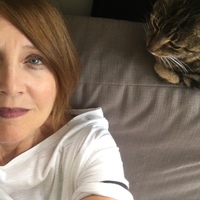- Department of English
College of Arts and Sciences
Saint Louis University
Adorjan Hall 231
3800 Lindell Blvd
St. Louis, MO 63108-3414
USA
Tel: 1 (314) 977-3007
Fax: 314 977 1514 - 1-314-977-3007
Ruth Evans
Saint Louis University, English, Faculty Member
Research Interests:
Introduction Let me begin by observing that Courtney Druzak's and Jade Godsall's very striking papers use very different disciplinary frameworks, and that while the session title Gender and Ecocriticism describes very well the focus and... more
Introduction Let me begin by observing that Courtney Druzak's and Jade Godsall's very striking papers use very different disciplinary frameworks, and that while the session title Gender and Ecocriticism describes very well the focus and methodology of Druzak's paper, it is not an adequate rubric for Godsall's project, which is not in any sense ecocritical (and was not intended to be). Where both papers coincide is in their interest in queer identity and the medium of water, and in their shared understanding that Galenic humoral theory is not as straight as it seems, but has queer potential. Godsall links the humors to gender identity historically, bringing out the handy-dandy nature of the ideology of the humors that is seen in the medieval link between the Devil and the feminine through his association with water. This allows her to use medieval humoral theory and medical discourse to lever notions of queer identity that are meaningful for readers today, opening up female identity and Catherine's joining with Christ's body in the Dialogues in a completely novel way. Druzak also resists " the binaristic logic of humoral theory " (6), but, by contrast, she argues provocatively that the sea, qua water, in Shakespeare's Pericles, is our " queer, non-binary third parent " (1), and that we are all made up of water and share a kinship with all forms of water, an understanding that provides the theoretical ground for practical activism in the present, namely to protest against the practice of fracking.
Research Interests:
Research Interests:
How did European road travellers in the later Middle Ages find their way from one part of a country to another? from one town to another? and within unfamiliar towns and cities? How did they plan their journeys? What aids did they use for... more
How did European road travellers in the later Middle Ages find their way from one part of a country to another? from one town to another? and within unfamiliar towns and cities? How did they plan their journeys? What aids did they use for getting to their destinations? Such questions seem obvious, yet there has been very little systematic attempt by road historians to answer them. Information about this topic is hard to come by because wayfinding is a practice that of its nature is not likely to leave any traces. The aim of this paper is to survey some of the evidence for medieval wayfinding and to provide some initial answers to these questions. 1 I will draw on a number of different disciplines, including urban studies and space studies, in order to understand the cultural and cognitive aspects of medieval wayfinding practices. 2 I will argue that in the absence of the technological and material aids that we now take for granted medieval travel presumed a culture of human cooperation that is very different from that of today. This paper is also a contribution to the neglected social history of the everyday in the European premodern era. 3 Medieval wayfinding is seldom, if ever, seen as worthy of comment, either by historical travellers or by modern commentators on those travellers. 4 J. J. Jusserand, for example, in his classic study of medieval wayfarers, never refers to the subject. 5 Nor does G.
